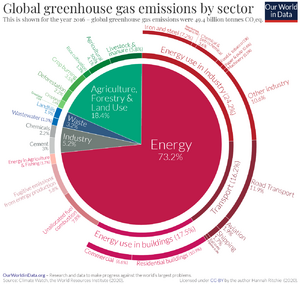Personal choices affect climate change
If you like this post, feel free to copy-paste it onto some other social media. Just make sure you also include the pie chart. 😀
Myth:
"Personal choices barely affect the planet! Carbon footprint calculations are just a big conspiracy by Big Oil to shift the blame onto you!!!"
Fact:

Let's start with the pie chart.
- Transport (passenger) is affected by how much people drive.
- Transport (freight & cargo) is affected by how much new "stuff" people buy. Same for manufacturing & mining.
- Agriculture is affected by food choices, and food wasted by people & businesses.
- Even business food waste is affected by consumer choices. When bakeries have far more day-old donuts than people are willing to buy, where do you think they end up? Yes some of them can & should be donated to homeless shelters, but keep in mind that 50% of food goes to waste (in Canada/US/Europe); homeless people are 1% of the population. We need more people eating the day-olds.
- Commercial buildings are affected by other consumer spending.
- Residential (housing) doesn't use a whole lot of energy except for heating & cooling. So yes, most "life hacks to save energy" barely do anything. But that doesn't negate all the other lifestyle factors above, which DO have a big impact.
- Heating & cooling are probably the only things that are NOT affected by personal choices, since they mostly depend on the weather.
Of course we need systemic changes too.
- In pursuit of consuming less stuff, it would help if we had right-to-repair (instead of planned obsolescence and code bloat). But people still have to actually choose to consume less.
- Same is true for driving. We need walkable cities, but we can't just go rebuilding everything (because that would have an even worse environmental footprint - mining & manufacturing all those materials). There are cheaper & better ways to make existing neighborhoods walkable (including suburbs), but they require that people actively choose a different lifestyle (local parks can be good places to build community).
Of course there is wealth inequality.
- I'm not saying that poor people in poor countries should consume less. The poorest 50% of the world has less than 10% of global emissions.
- But I AM saying that the average "middle-class" person (and if you don't like that word, substitute it with something else) in DEVELOPED countries (that's most of us here, I think) DOES in fact need to consume quite a lot less. And we can do it without sacrificing that much quality of life.
Maybe I'm preaching to the choir here - maybe most of us here are already frugal enough. But the average person isn't.
Common behaviors I see from common people:
- Buying new furniture / electronics / clothes even though their current stuff still works perfectly fine. Then later they throw out all that old perfectly-good stuff, for the sake of "de-cluttering". I see this all the time because I pick the trash. Btw thrift shops already receive more goods than they can sell. More people need to learn to be ok with having old goods.
- Ordering food, not finishing all of it, and throwing the rest in the trash. Most people don't realize that day-old french fries can be revived by adding them to soups.
Our environmental impacts are so normalized that we don't even notice them. Maybe it's because big corporations brainwashed us, but they ain't gonna un-brainwash us. We gotta do that part ourselves.
Lastly, I guess I have to address the "big oil invented the carbon footprint" claim. Any choices that ACTUALLY reduce your carbon footprint will cause fossil fuel companies to lose money - that's just basic math. So if fossil fuel companies want you to replace your appliances with "energy-efficient" models, it's probably because those appliances take so much energy to manufacture that you're not actually reducing your footprint at all. If it's "green" and expensive, it's probably greenwashing. Real environmentalism comes from frugalism.
I'm not sure how we can get the message out to more people, but we certainly need to. It's a tough pill to swallow, but not as tough as trying to scale up renewables and electric cars by a factor of 100 (are there even enough rare metals for that? even with nuclear power, the available tech depends on uranium-235 which is too scarce). Consuming less goes hand-in-hand with working less. Maybe we need a general labor strike that can reduce production just enough to save the planet. We'd have to coordinate it carefully to avoid taking down essential things like food (for which the main target is food waste instead). A shorter work week would benefit most people and the planet. All of those are supply-side changes that would depend on everyone to take action at once. That's why I focus on the demand-side instead for now, because it doesn't need as much coordination. Don't underestimate the power of anti-consumerism.